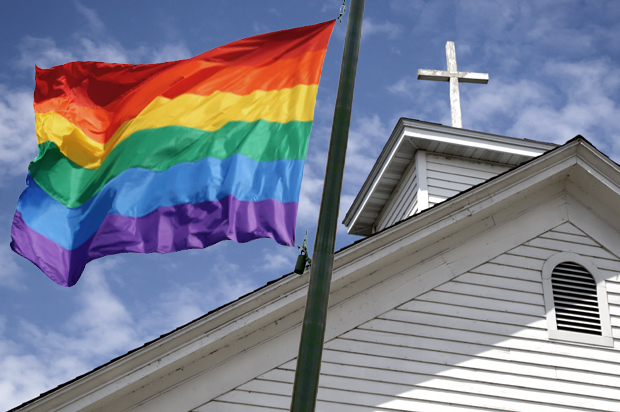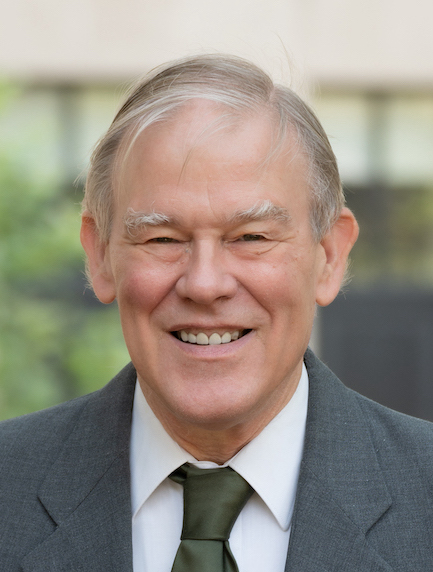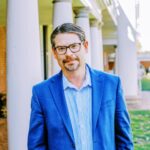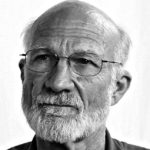The previous article on this topic reviewed a panel discussion at Union Theological Seminary on December 7, concerning the new phase of the homosexual/transgender revolution, which is the international suppression of religious (or other) opposition to homosexuality and transgenderism in the private as well as public world, mobilizing LGBT-friendly religious leaders in support of this project, and suppressing religious opposition. In other remarks at the panel, there was discussion of what place, if any, religious freedom should have with respect to homosexuality, transgenderism, (and presumably) sexual morality in general.
Moderator Fred Davie of Union Seminary asked Bishop Joseph Tolton of the Council for Global Equality and the Fellowship of Affirming Ministries, for his remarks. Tolton said that on December 7, 2011, then Secretary of State Hillary Clinton announced to the United Nations that the U.S. would support LGBT identity as a right globally. Nations around the world “were clear that U.S. was honoring our traditions as a beacon of light, an epicenter of tolerance, and the benefactors of diversity … Sovereignty over the body is the most basic and profound form of liberty.” This shows why LGBT activists refer to homosexuality and transgenderism as a “fundamental right” (although nowhere referred to in the U.S. Constitution or the U.N. Universal Declaration Human Rights). The advocates of this “right” maintain, as Carl Trueman has incisively explained, that sexual inclination and behavior is basic to who one is, perhaps the most basic fact about a person, and thus superior to the freedoms of religion and speech. Any condemnation of consensual sexual behavior, which is included in most world religions, is thus “violence.” As an aside (and without addressing other issues) it could be noted that in today’s environment, however, it seems that the Left considers “sovereignty over the body” to involve the right to kill another human being in one’s body, but not the right to refuse a vaccination.
Tolton said that the pro-LGBT objective will be to “establish a working global network” of pro-LGBT organizations and individuals who will struggle for LGBT acceptance (presumably to be mandated by law). Needed are “prophetic and courageous” leaders “who have a history” of supporting “LGBTI dignity, they decry anti-LGBTIA political and social campaigns and they strategically connect the dots between LGBTIA dignity, women’s rights, anti-black racism, and anti-Semitic violence.” This seems to be Tolton’s version of intersectionality. But the appeal to “dignity” is wrong, because personal behavior must be subject to public judgment; anything else is anarchy. Dignity cannot be based on desires and affections in any consistent way, but must be based on unchanging truth about a human nature and on individual character, not on self-assertion. All human beings have dignity, but the category of “human” includes many sub-categories of behavior that certainly do not have dignity. Common criminals are human, and have dignity as human beings, but not as criminals. Nor do white collar criminals have dignity because they may be genteel. It is only by (liberal/left) sensibility that LGBT behavior can be singled out for “dignity.” But if it is singled out, opponents can be stigmatized, and their classic freedoms of religion and speech attacked.
Tolton expressed “our hope, that the gentle tide of inclusion will become a roaring wave.” The tide is “not proprietary to the Western Hemisphere, but is also flowing” in the non-Western world. The international pro-LGBT coalition will be “multi-faithed, and geographically diverse.” He said the year 2022 is “year zero” (perhaps meaning that the Biden Administration is the beginning of a permanent leftist regime in the United States, which will support mandatory global acceptance of the sexual revolution). In this global campaign, people will be “patient, prayful, and deliberative.” Conversations will “document the connection between theological ideas and political postures that threaten social cohesion.” This then would seem to be a call for governments to ban “theological ideas” that “threaten social cohesion.” Apparently governments must finally ban wrong theology, in this case anti-LGBT theology, which is the theology of most traditional religions. Conversations will also propose “a pro-active counternarrative, and a narrative for helping religious ideas that honor a call for human rights, inclusive social environment, and economic equity” (i.e., a counternarrative that is a wish-list for whatever the Left wants, perhaps in particular, an environment that excludes religious ideas the Left doesn’t like). In the last analysis, this is a call to replace most world religions with a liberal/left state religion.
Future conversation will highlight the connection between “faith rhetoric and faith leaders that promote anti-LGBT sentiment.” Union Seminary will host quarterly conversations of global pro-LGBT religious leaders. This will be part of the U.S government’s 2022 Summit for Democracy. It should result in proposals for pro-LGBT work in 2023. The point is to establish an “influential network of faith leaders who have access to government leaders around the world at the highest level.” (Perhaps these leaders can then enact the LGBT agenda as much as possible without public debate, as was attempted in Great Britain, and recently happened in Canada). “LGBT rights” (i.e., mandatory acceptance of homosexuality) will be elevated by including faith leaders, who will be “a catalyst for pro-LGBT faith organizing around the world and increase momentum in this particular sector” (apparently, that of organized religion).
The first question in a question and answer session asked what the pro-LGBT movement’s posture should be (apparently internationally) regarding conservative Christians using religious freedom to “discriminate against LGBT people” by refusing to serve their weddings – should “a middle ground” be sought in the interest of “unity and common good?”
Davie seemed to deflect this question. He asked instead about “whether clergy should be required to do weddings of LGBTQIA folks.” Of course the truly contentious topic, at this point, concerns facilitating homosexual or transgender behavior in the public square – the right of bakers, florists and photographers to decline to facilitate homosexual ceremonies that contradict religious precepts, or the right to maintain single sex rest rooms. But Davie said he would “prejudice the conversation by saying that I believe if we’re going to uphold religious freedom, that [presiding at weddings] should not be a requirement, but that does not mean that we should not call our colleagues to task for excluding LGBTQIA folks from marriage within their faith traditions.”
Steve Chalke of the Oasis Charitable Trust said that “a real problem around the world is fear.” People are afraid to be LGBT-friendly for fear of what other people will think. He said that he has found that after being privately invited by clergy to speak at churches about LGBT inclusion, many listeners supported him, and commented that the clergymen (who secretly invited Chalke) desperately need to hear the message of inclusion. Chalke believes that many people’s private theology is much more liberal (i.e., inclusivist) than their publically held theology. He asked “how we encourage people not to fear?”
Essy Adhiamo of the Initiative for Equality and Non-Discrimination certainly did not offer an opinion likely to alleviate fear. She maintained that religious activities should not be exempt from antidiscrimination law. Everyone should “be very intentional in following the law.” Pro-LGBT activists should make an example out of people who are “violating our fundamental human rights” (apparently, by not accepting what is supposed to be the most basic of all rights, that to sexual identity).
L. Ramakrishnan of Solidarity and Action Against HIV Infection India (SAATHII) on the other hand said he believes in “separation of church and state” and therefore thinks that clergy should not be required to celebrate LGBT weddings. But “anyone violating human rights should be held accountable by the law.” There should also be “a secular way” of gaining (apparently sexual) rights.
Julius Kaggwa of the Support Initiative for People with atypical sex Development (SIPD) Uganda said that if violence (which was not specified, although physical violence may be what was meant) is perpetrated against you, you must find some other identity rather than LGBT identity to claim injury. He thought that professionals, such as doctors, can “engage at the legislative level” to try to change the situation. But they must be “very creative and very strategic.”
Davie noted that a questioner from General Theological Seminary asked what other countries besides the U.S. are “blessing” the new pro-LGBT “conversation.” Davie then commented that the conversation is really about combatting anti-LGBT practices worldwide. This a very broad concept, which reasonably includes expressed opposition to homosexuality, and also conscience objections to facilitating homosexual or transgender behavior. This will be the major task of the LGBT liberation movement this year and in future years. An important question, Davie observed, in mandating global acceptance of homosexuality, transgenderism (and likely the standard of consensual sex generally) is how U.N. treaties and the Universal Declaration of Human Rights can be amended to include LGBT rights, and then how these rights can be enforced. As this writer noted in a previous article, no rights to any of this are mentioned in binding U.N. documents or treaties, but only in the non-binding recommendations of the U.N. bureaucracy (which nevertheless get cited by foreign courts in imposing the sexual revolution on their respective countries).
The final speaker, Ruth Messinger, Global Ambassador of the American Jewish World Service, said the new gospel of inclusion is better than “heteronormative, patriarchal societies, colonialist impulses.” The new gospel, however, really mandates anarchy, since desire is elevated into a right, and therefore there are no clear concepts of what words mean, since any clear definitions (such male or female, parent or child, theist or atheist) would constrain what people might want, as the indefinite LGBT+ initialism makes clear. But she was clear in saying we should oppose “conversion therapy” and the “weaponizing of Scripture.” The use of these terms is ominous, since it signals that the global pro-LGBT coalition is demanding that the Biblical condemnations of homosexuality be made illegal. “Hatred and exclusion” she said “leads to the religious addiction to power, and often loss of lives.” This really spells out more clearly that hatred and condemnation of sin should be illegal, and a sweeping claim that opposition to homosexuality is based on a desire for power over others rather than obedience to God (which obedience is for many people the true reason for opposing homosexuality). There is probably a claim that religious opposition to homosexuality results in physical violence, which amounts to saying that crime justifies sin, although “loss of lives” could also mean the mental anguish of thinking oneself a sinner (which is in fact entirely proper).
Are religious leaders seeking power by opposing homosexuality? Maybe in some countries yet to be affected by the LGBT revolution they are, but in the West, and indeed in non-Western countries that are beginning to be affected, it is far easier to simply “go with the flow,” as the panel obviously is doing everything in the power to make happen
Messinger closed by appealing to the “better natures of our faith communities,” which really is an appeal to love to justify setting aside the holiness that God eternally requires (shown by the exclusion of everything impure in the New Jerusalem).
A number observations need to be made about the project being advanced by the international LGBT movement and supported by the Biden Administration. First, the heart and soul of this project is that common religious doctrine against homosexuality (by no means restricted to Christianity) is wrong, and should really be illegal. But if “dignity” (or “freedom” or “equality”) is to make sense, it must be based on a common understanding of unchangeable human nature, known from antiquity. Dignity cannot be based on mere desires, To do so is wildly irrational; it is in fact only by (liberal/left) sensibility that LGBT inclination and behavior can be privileged from the discrimination to which everyone else’s personal behavior is subject. By contrast, religious freedom is not privilege, but is held by everyone, although no one can require complicity by others in his or her religion.
Secondly (but far more importantly, indeed, the absolutely overriding consideration) is that religious doctrine is by its nature ultimate. It cannot be changed by the state, although it can be suppressed. American Christians have the benefit of having the ultimacy of religious commitments recognized by the Constitution, and by the First Amendment’s author, James Madison, in his Memorial and Remonstrance (which spells out that our duty to God is superior to our duty to the state). But even where Christians do not have this benefit (widely ignored even in the United States, where sexual orientation and gender identity (SOGI) laws often take precedence), it remains that our ultimate duty is to God, to obey him without regard to penalty. As with the Biblical heroes and saints, our love and loyalty to God must always be greater than our loyalty to the state.






Comment by Donald Link on January 8, 2022 at 11:50 am
“Religious left” is an oxymoron but I do get the point.